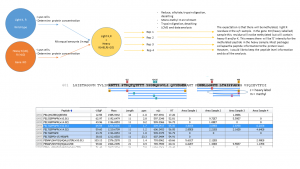We have used the PTMScan® Mono-Methyl Arginine Motif [mme-RG] Kit #12235 from CST in order to determine novel PRMT7 substrates. In preliminary experiments done few years ago by our pharma partner several novel potential PRMT7 substrates were discovered with the kit, including HSP70, which was further validated by different methods (https://www.biorxiv.org/content/10.1101/503136v2). In order to obtain biological replicates, recently, we used the same kit. In the initial experiment we followed exactly CST’s protocol ( https://media.cellsignal.com/pdf/12235.pdf) and observed low peptide counts and high background in the IP-ed samples and no presence of our positive control HSP70 peptide FELTGIPPAPR. Since there was some ambiguity about the desalting step in section 5, we had several discussions with CST support. The fruitful discussions compelled us to share a more detailed protocol with the goal of improving the success rates of these enrichments.
In our second attempt, the input or ‘pre-IP’ samples had high counts of HSP70 peptide FELTGIPPAPR, which R is methylated but not heavy labelled in PRMT7 WT and unmethylated in heavy labelled peptide (PRMT7 KO), which is with agreement with our previous findings Fig.1. The HSP70 methylation is visibly detected by anti-Rme1 CST antibody (the same one used in the kit) in western blot, so it should be immunoprecipitated, however the peptide could only be detected in one of the 3 immunoprecipitated samples and at very low counts. We have no idea why it is not working in our hands, but if anyone consider using this kit, I recommend looking at my comments on zenodo . Good luck!

Fig.1. The MS data generated by Suzanne Ackloo and Amber Couzens.

Here is the most recent publication with other modifications to the protocol.
https://www.ncbi.nlm.nih.gov/pubmed/31809900
In the methods section, the authors specify that they incubated the digested peptides with antibody beads overnight:
“To enrich different types of modified peptides, six kinds of panantibodies beads that were specific against Kme1, Kme2, or Kme3 lysine; or MMA, aDMA, or sDMA were used. Trypsin-digested peptides dissolved in NETN buffer (100 mM NaCl, 1 mM EDTA, 50 mM Tris-HCl, 0.5% NP-40; pH 8.0) were individually incubated with the six kinds of
specific antibody beads at 4 °C overnight with gentle shaking according to the manufacturer’s instructions”